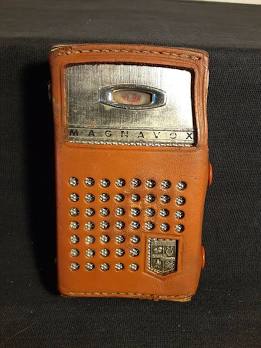
I think it was my fourteenth birthday when my father bought me a transistor radio. They were a wonder. Mine was small enough to hold in a hand, with a little leatherette case and ear bud, from Japan.
Deep in the mythology of the Depression years, radio was center stage as FDR gave his “fireside chats”, the original twentieth-century mass direct-to-voter news and politics outreach. My earliest radio memories were of my parents intently listening to the news with Edward R Murrow in the McCarthy era, which I didn’t understand at the time, but knew it was something important.
Radio was also music and entertainment. I remember coming come home from elementary school for lunch. My mother would serve us soup and sandwiches to the tunes of her adult world: Bing (Crosby) and Rosie (Rosemary Clooney), Patti Page with “How Much is that Doggie in the Window?”, Patsy Cline doing “South of the Border Down Mexico Way”, Doris Day singing “Que Sera, Sera”.
John R and the Wolfman kept me company by the light of the radio by my bed (Don Williams)
I got up this mornin’, I turned on my radio—I was checkin’ out the surfin’ scene to see if I would go (Beach Boys)
I think it was my fourteenth birthday when my father bought me a transistor radio. They were a wonder. Mine was small enough to hold in a hand, with a little leatherette case and ear bud, from Japan. Advertisements that were geared towards teenagers showed joyous, trim, good-looking, white boys and girls frisking at the beach or dancing to their transistor radios, but I pretty much just listened in my room. Every week there was a countdown to number one on the hit parade, usually something from Motown, the Beatles, or the Beach Boys.
The stations and “the star making machinery behind the popular song” dictated which ones we would hear; everyone around me would be familiar with the same songs, could recall when they came out by mapping them to the grade we were in at the time. That was when every year, and portion of a year, remained fresh in my memory, instead of slipping by in a blur.
After six hours of school, I’ve had enough for the day—I hit the radio dial and turn it up all the way (Beach Boys)
I’m gonna write a little letter, gonna mail it to my local DJ. It’s a rockin’ little record I want my jockey to play (Chuck Berry)
The local station had a weekly “make it or break it” feature. They would spin the new song, and then play it more over the next few weeks if people voted it up. I never called in except once, in 1966, when I heard them play “The Sounds of Silence”. It was a revelation—yes! Make it! I still remember the tally–93% agreed with me.
Well she got her daddy’s car… and with the radio blasting goes cruisin’ just as fast as she can now (Beach Boys)
Cruisin’ and playin’ the radio, with no particular place to go (Chuck Berry)
Going down the old mine, with a transistor radio (Van Morrison)
It is hard to separate radio from car culture; so much listening happened on trips, during commute hours, on dates, or generally driving around. So much driving around. Getting access to wheels meant cranking up the radio to your station of choice, independence, romantic options.
Janie was lovin’ me, she was the queen of my nights, there in the darkness with the radio playing low (Bob Seger)
Oh honey, you turn me on, I’m a radio (Joni Mitchell)
In 1970, I took what is now called a “gap year” following sophomore year of college; to me it was more of an an “I am so out of here and who knows if I will come back” year. I lived in Berkeley and tried to find a job and a purpose. I did find Pacifica Radio, KPFA, which was community radio–youth, anti-war and counterculture oriented. They covered local demonstrations and current events, and played good music. Later, when I returned to the Bay Area, I listened to Chuy Varela play Salsa on Sunday afternoons, and Kris Welch on the morning show for news. There was always a pre-set to 94.1
I’m dialin’ ‘cross the radio for a song that I can sing (Randy Travis)
In later years, my clock radio was set to the Bay Area station KJAZ, with Stan Dunne. A great way to start a day. Every year in February, he would sneak in “My Funny Valentine” by various jazz artists, and if you recognized it and called right away, you won something—a mug maybe. I never won. Mug no, but memories, yes.
Someone found a letter you wrote me on the radio, whoa oh oh oh, on the radio, whoa oh oh oh (Donna Summer)
And if you’re still within the sound of my voice, over some radio, I just want you to know–you were always my only choice (Linda Ronstadt)
Travel and radio are great. In different formats and languages, you catch a bit of news, weather, music, and of course advertisements. It can be sad to find how much is the same everywhere, although even the ubiquitous bubble gum pop songs and rap music in, say, Spanish or German, can provide local perspective. And sometimes you come across a gem like “Oh Susannah” playing ectopically—really?
In Mississippi: Ominous sky–find the car’s weather station—uh oh, tornadoes spotted at “Rggglrrgh”! Get out map—where could that be? Sky looks BAD, funny green color. Radio repeats: take cover, tornado at “Rggglrrgh”. No cars on the road—weather coming from the west—we turn to the northeast and hit it on the Natchez Trace parkway—90 miles an hour plus. Next morning, paper clarifies it was “Ridgeland”, close to where we were, right next to a reservoir–that tingly Spidey sense of danger didn’t lie.
When we officially “entered” Canada in 2004, we turned the radio to the CBC. We were weary of incessant bad news: war in Iraq and Afghanistan, Guantanamo, Arnold Schwarzenegger, HMO’s, mass shootings. As we headed East through the Fraser Valley, suddenly there was a special news bulletin–what now? Local sheep were being threatened by a pack of coyotes! High five! How glorious to be where THAT was the crisis du jour!
The radio and the telephone and the movies that we know may just be passing fancies and in time may go (George and Ira Gershwin)
Video killed the radio star, in my mind and in my car (The Buggles)
Radio isn’t dead yet, despite CDs, Walkman and IPods, MP3 players, MTV, streaming and social media, podcasts and blogs, cable and YouTube and Vimeo, Spotify and Pandora, Apple ITunes and Google, and smart phones. I only listen when I am driving anymore, often the scratchy NPR (now NPB—Radio has become Broadcasting to reflect different platforms) station from Omak, Washington. Radio has been a lifelong companion. I still appreciate that connecting voice. And for the future? Que sera, sera.



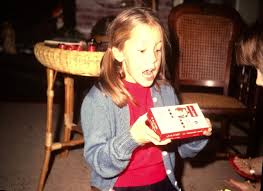
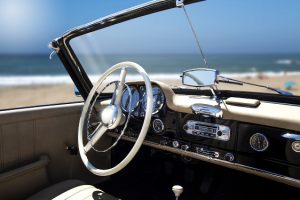
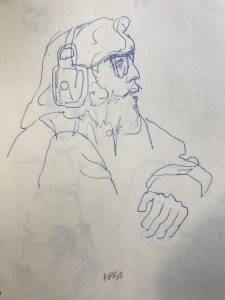
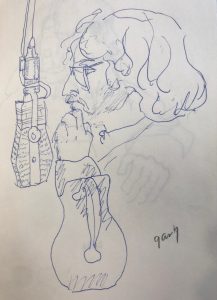

Khati, I love that you found quotes from songs to illustrate each section of your story! I knew all of them except the Don Williams one (not a country fan) and (surprisingly) the Linda Ronstadt one, which I’m listening to now as I write this comment. Your transistor radio that fit in the palm of your hand was just like the one I describe in my own story, although mine was in a black case instead of brown. So many things to love in this story! Thanks for sharing these disparate pieces of your life as reflected in radio.
I thought of you as I picked out the songs. They just came to me—old lyrics stick in my brain and I was surprised at all the radio references out there. Certainly brought back lots of memories.
What a great review of all the radio changes over time, Khati. Your “Transistor Sister” salutes you. I recall KPFA well at the time and love the sketches. It was an experience to be in the Berkeley area in the 1970s.
Yes, Berkeley in 1970-71 was an experience. I missed the People’s Park confrontation, but lived in an apartment at Haste and Telegraph, across from Cody’s bookstore, and half a block from the park. I did get to help on the mural that went up with the history of the park though.
I loved this, Khati. Especially the bold lines from so many familiar songs about radio. Boy, do I ever remember Que Sera, Sera. Takes me back to my childhood family vacation on Cape Cod when it seemed like that was the only song playing. You do a wonderful job of capturing what radio has meant for most of us.
Que sera, sera resonated too because I WAS just a little girl when it came out. And it did play a lot!
I love the way you intersperse the lyrics from songs that reference radios throughout your radio journey, coupled with travel, the open road and car culture. The songs do resonate and are a great counterpoint to your story, as you make your journey through life.
I hadn’t really thought that much about the role of radio in my life, but as I started writing, I realized it played more of a part than I had remembered. Not the least, through the songs, which remain clear after all these years.
Wow, Khati, you were indeed in the middle of things. We’d take the bus to Berkeley from Mills, of course, and after that I lived in two different places in the Northside flats. A lot quieter than Southside, but rather down-at-the-heels at the time.
We didn’t realize it when we got the apartment–were new to the area in 1970, and had been working our way up from Shattuck, found a great summer rate, said yes, stepped out and found out we were right around the corner from Telegraph Ave. Cool. Then people started telling us to watch out for the tear gas. But it had started to quiet down. Still. Interesting times.
I, too, love that your history of radio is so richly illustrated with the song lyrics. Just a brilliant touch for this story about the evolution of radios — and your own evolution too. So far, of course (as you slyly suggest at the end).
It’s not over until it’s over, right?
Wow Khati, what a wonderful peek into your listening life and complete with travelogue!
You mention that your mother listened to Rosemary Clooney, but as you may know she made a marvelous comeback in later life, singing jazz and the Great American Songbook in cabaret. We would never miss her when she was in New York. If you never appreciated her, or want to appreciate her anew, get her album On the Road Again!
My parents were fans of the Great American Songbook, and my dad used to play lots of those tunes on the piano. I inherited his sheet music and fake books–yay! Thanks for the tip on the Rosemary Clooney album.
The way you intertwined lyrics with memories made me feel like I was twisting the tuner from one station to another, voices and music fading in and out interspersed with the static of the times. Wonderful story, Khati!
Ah yes, the sound tracks of our lives. If you ever saw the movie “Across the Universe”, it was a very true-to-the-times fantasy set to Beatles music, remarkably effective.
I’ll check it out…thanks!
You had me at que sera sera. Mary, a wonderful person who cleaned our house when I was growing up, would sing it frequently while she worked. At the time I knew it from no other place; I thought it was her song. To the point that when I ultimately heard Patti Page sing it I had simultaneous contradictory reactions – “oh, that’s where it comes from” and “hey, wait, that’s Mary’s song.
I didn’t know how popular that song was either–it resonated with me, and it seems it was one of those catchy, existential tunes that everyone related to. I love the way you got to know it. I had a somewhat similar dissonance when I heard the original versions of British Invasion groups, who had recorded R & B tunes originally recorded by Black artists and then popularized them to a white audience. “Please Mr Postman” and “Roll Over Beethoven” were not by the Beatles? “King Bee” was not by the Animals? etc etc etc.
Loved your interspersed lyrics, Khati! Terrific choices! That really brought it all home for me. Also your mother’s faves on what used to be called The Hit Parade, playing during lunch. Something peaceful and stable about that. Travel and radio was good, but things got pretty grim in the Midwest on those cross-country commutes. I remember waiting and listening to “The Letter” by the Boxtops, though while on tour. The whole theater company would sing the lyrics at the top of our tour-weary lungs. Wolfman Jack always told me I was almost there on the way Westward and your mention of Telegraph and Shattuck and the teargas brought to mind Bloody Thursday, 1969, when the Blue Meanies, the Alameda County Sheriff’s Dept loaded their shotguns with birdshot to teach us a deadly lesson. I loved your description of outrunning a tornado. Great fragmented impressions!
Sounds like you were there in 1969–very intense! Great shared memories from you too.